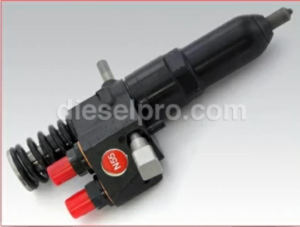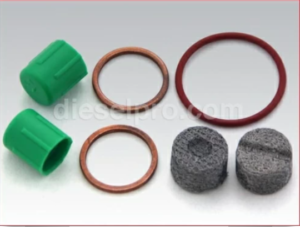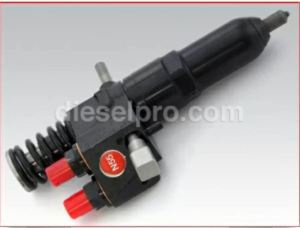
Introduction
Injectors play a critical role in ensuring efficient combustion by delivering the precise amount of fuel into the cylinders at the correct time and in the appropriate spray pattern. A malfunctioning injector can disrupt this balance, resulting in performance issues and potentially causing long-term engine damage. Understanding the symptoms, causes, and solutions for injector problems in Detroit Diesel V71 engines is vital for effective maintenance and troubleshooting.
Symptoms of Injector Malfunction

Malfunctioning injectors exhibit a range of noticeable symptoms, including:
- Engine Misfiring
- Irregular combustion cycles lead to uneven engine operation.
- Misfiring often results in a loss of power and hesitation during acceleration.
- Excessive Exhaust Smoke
- White Smoke: Indicates unburned fuel due to delayed or incomplete combustion.
- Black Smoke: Results from excessive fuel delivery or poor atomization.
- Rough Idling
- The engine struggles to maintain a steady idle speed, accompanied by vibrations and fluctuations in RPM.
- The engine struggles to maintain a steady idle speed, accompanied by vibrations and fluctuations in RPM.
- Increased Fuel Consumption
- Faulty injectors may over-deliver fuel, reducing overall efficiency.
- Faulty injectors may over-deliver fuel, reducing overall efficiency.
- Difficulty Starting
- Poor atomization or incorrect timing can hinder proper combustion during startup.
- Poor atomization or incorrect timing can hinder proper combustion during startup.
- Knocking Sounds
- Faulty injectors may cause pre-ignition or uneven combustion, resulting in audible knocking.
- Faulty injectors may cause pre-ignition or uneven combustion, resulting in audible knocking.
Causes of Injector Malfunction

Understanding the root causes of injector issues is essential for effective repair. Common causes include:
1. Clogged Injector Nozzles
- Accumulated deposits from carbon, dirt, or impurities in the fuel block the fine spray holes of the injector nozzles.
- Prolonged operation with contaminated fuel exacerbates the issue.
2. Incorrect Injector Timing
- Incorrect timing due to improper installation or wear disrupts the synchronization between fuel delivery and piston movement.
- Advanced timing can cause premature ignition, while delayed timing results in unburned fuel.
3. Worn or Damaged Components
- Injector plungers, springs, or nozzles can wear out over time, compromising performance.
- Seal failures can lead to fuel leaks and pressure loss.
4. Fuel Contamination
- Presence of water, dirt, or microbial growth in the fuel damages injector components.
- Low-quality fuel lacking detergents contributes to injector fouling.
5. Faulty Injector Adjustments
- Improper injector height adjustments result in uneven fuel distribution and inefficient combustion.
6. Air in the Fuel System
- Air bubbles in the fuel lines or injectors cause inconsistent spray patterns and reduced pressure.
Injector & Related Components for 6V71 Non- Turbo Detroit Diesel Marine & Industrial Engines
Injector & Related Components for 6V71 Turbo Detroit Diesel Marine & Industrial Engines
Injector & Related Components for 8V71 Non- Turbo Detroit Diesel Marine & Industrial Engines
Injector & Related Components for 8V71 Turbo Detroit Diesel Marine & Industrial Engines
Injector & Related Components for 12V71 Non- Turbo Detroit Diesel Marine & Industrial Engines
Injector & Related Components for 12V71 Turbo Detroit Diesel Marine & Industrial Engines
Injector & Related Components for 16V71 Non- Turbo Detroit Diesel Marine & Industrial Engines
Injector & Related Components for 16V71 Turbo Detroit Diesel Marine & Industrial Engines
Comprehensive Solutions

Cleaning and Replacing Injectors
Cleaning Procedure
- Preliminary Steps:
- Shut down the engine and ensure it has cooled.
- Disconnect the fuel lines and remove the injectors following the manufacturer’s instructions.
- Cleaning Process:
- Use a high-quality injector cleaning solution to dissolve carbon and fuel deposits.
- Submerge the nozzles in the cleaning solution and agitate gently.
- Clean the injector bodies with a soft brush to remove surface contaminants.
- Use compressed air to dry the injectors and clear nozzle holes.
- Reinstallation:
- Inspect the injectors for any remaining deposits or visible damage.
- Reinstall the cleaned injectors, ensuring all connections are tight and leak-free.
Replacing Injectors
- Select premium aftermarket injectors compatible with Detroit Diesel V71 engines.
- Install the new injectors, ensuring proper alignment and secure connections.
- Calibrate the injectors according to the engine’s specifications for optimal performance.
Verifying Injector Timing
- Preparation:
- Access the timing marks on the engine and injector assembly.
- Use a dial indicator or timing tool designed for Detroit Diesel engines.
- Adjustment:
- Rotate the engine to the correct position for injector timing using the timing marks.
- Adjust the injector rocker arm or timing screw to achieve the recommended clearance or timing value.
- Validation:
- Start the engine and monitor performance, checking for smooth operation and consistent power delivery.
- Start the engine and monitor performance, checking for smooth operation and consistent power delivery.
Injector & Related Components for 6V71 Non- Turbo Detroit Diesel Marine & Industrial Engines
Injector & Related Components for 6V71 Turbo Detroit Diesel Marine & Industrial Engines
Injector & Related Components for 8V71 Non- Turbo Detroit Diesel Marine & Industrial Engines
Injector & Related Components for 8V71 Turbo Detroit Diesel Marine & Industrial Engines
Injector & Related Components for 12V71 Non- Turbo Detroit Diesel Marine & Industrial Engines
Injector & Related Components for 12V71 Turbo Detroit Diesel Marine & Industrial Engines
Injector & Related Components for 16V71 Non- Turbo Detroit Diesel Marine & Industrial Engines
Injector & Related Components for 16V71 Turbo Detroit Diesel Marine & Industrial Engines
Preventive Maintenance for Injectors

Regular maintenance can prevent injector issues and prolong their lifespan.
Using Clean Fuel
- Use high-quality diesel fuel with detergent additives to reduce deposit formation.
- Avoid fuel contamination by ensuring proper storage and filtration practices.
Replacing Fuel Filters
- Replace fuel filters at recommended intervals to prevent dirt and water from reaching the injectors.
- Consider installing a secondary filter for additional protection in high-contamination environments.
Periodic Injector Testing
- Test injectors for spray patterns, pressure, and timing during routine engine servicing.
- Use specialized injector testing equipment for precise diagnostics.
Keeping Detailed Records
- Maintain a log of injector maintenance, including cleaning, replacements, and timing adjustments.
Injector & Related Components for 6V71 Non- Turbo Detroit Diesel Marine & Industrial Engines
Injector & Related Components for 6V71 Turbo Detroit Diesel Marine & Industrial Engines
Injector & Related Components for 8V71 Non- Turbo Detroit Diesel Marine & Industrial Engines
Injector & Related Components for 8V71 Turbo Detroit Diesel Marine & Industrial Engines
Injector & Related Components for 12V71 Non- Turbo Detroit Diesel Marine & Industrial Engines
Injector & Related Components for 12V71 Turbo Detroit Diesel Marine & Industrial Engines
Injector & Related Components for 16V71 Non- Turbo Detroit Diesel Marine & Industrial Engines
Injector & Related Components for 16V71 Turbo Detroit Diesel Marine & Industrial Engines
Advanced Troubleshooting Techniques

For persistent injector problems, advanced diagnostic methods may be required.
Injector Pop Testing
- Use a pop tester to measure the opening pressure and spray pattern of each injector.
- Compare results against the manufacturer’s specifications to identify faulty injectors.
Cylinder Performance Testing
- Perform a cylinder drop test to determine the performance of individual cylinders.
- Replace or service injectors in underperforming cylinders.
Fuel System Pressure Testing
- Measure fuel rail pressure to ensure the injectors are receiving adequate fuel supply.
- Address any pressure irregularities by inspecting fuel pumps and lines.
Injector & Related Components for 6V71 Non- Turbo Detroit Diesel Marine & Industrial Engines
Injector & Related Components for 6V71 Turbo Detroit Diesel Marine & Industrial Engines
Injector & Related Components for 8V71 Non- Turbo Detroit Diesel Marine & Industrial Engines
Injector & Related Components for 8V71 Turbo Detroit Diesel Marine & Industrial Engines
Injector & Related Components for 12V71 Non- Turbo Detroit Diesel Marine & Industrial Engines
Injector & Related Components for 12V71 Turbo Detroit Diesel Marine & Industrial Engines
Injector & Related Components for 16V71 Non- Turbo Detroit Diesel Marine & Industrial Engines
Injector & Related Components for 16V71 Turbo Detroit Diesel Marine & Industrial Engines
Upgrades and Enhancements for Injectors
Modern upgrades can enhance injector performance and reliability.
High-Performance Injectors
- Install injectors with improved spray patterns and materials for better atomization and durability.
Injector Cleaning Additives
- Use fuel additives designed to clean injectors and remove deposits during operation.
- Choose additives compatible with Detroit Diesel V71 engines.
Injector & Related Components for 6V71 Non- Turbo Detroit Diesel Marine & Industrial Engines
Injector & Related Components for 6V71 Turbo Detroit Diesel Marine & Industrial Engines
Injector & Related Components for 8V71 Non- Turbo Detroit Diesel Marine & Industrial Engines
Injector & Related Components for 8V71 Turbo Detroit Diesel Marine & Industrial Engines
Injector & Related Components for 12V71 Non- Turbo Detroit Diesel Marine & Industrial Engines
Injector & Related Components for 12V71 Turbo Detroit Diesel Marine & Industrial Engines
Injector & Related Components for 16V71 Non- Turbo Detroit Diesel Marine & Industrial Engines
Injector & Related Components for 16V71 Turbo Detroit Diesel Marine & Industrial Engines
Environmental Considerations
Operating in Harsh Conditions
- In dusty or humid environments, monitor injectors more frequently for signs of fouling or wear.
Marine Applications
- Salt and moisture exposure in marine environments necessitate more frequent injector maintenance to prevent corrosion and clogging.
Conclusion
Proper maintenance and timely troubleshooting of injectors in Detroit Diesel V71 engines are crucial for maintaining performance and efficiency. By understanding the symptoms and addressing the root causes, operators can ensure their engines deliver consistent power and reliability. Regular cleaning, timely replacements, and adherence to preventive maintenance schedules will help keep injectors functioning optimally, minimizing downtime and repair costs.
This expanded section now provides a detailed guide on injector troubleshooting, maintenance, and upgrades, aligning with your preference for comprehensive content. Let me know if further enhancements are needed!
Injector & Related Components for 6V71 Non- Turbo Detroit Diesel Marine & Industrial Engines
Injector & Related Components for 6V71 Turbo Detroit Diesel Marine & Industrial Engines
Injector & Related Components for 8V71 Non- Turbo Detroit Diesel Marine & Industrial Engines
Injector & Related Components for 8V71 Turbo Detroit Diesel Marine & Industrial Engines
Injector & Related Components for 12V71 Non- Turbo Detroit Diesel Marine & Industrial Engines
Injector & Related Components for 12V71 Turbo Detroit Diesel Marine & Industrial Engines
Injector & Related Components for 16V71 Non- Turbo Detroit Diesel Marine & Industrial Engines
Injector & Related Components for 16V71 Turbo Detroit Diesel Marine & Industrial Engines



 Free US Calls: 1-888-433-4735
Free US Calls: 1-888-433-4735 International: 305-545-5588
International: 305-545-5588